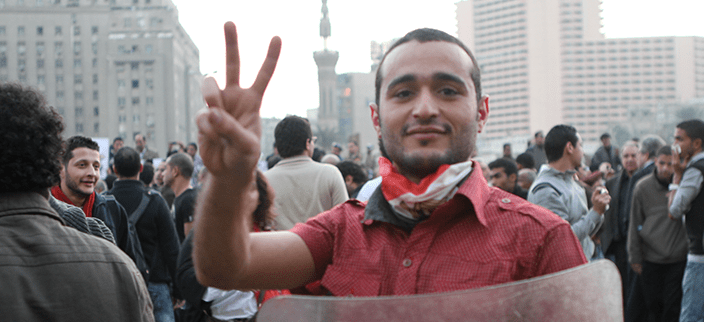In the latest episode of what is becoming an increasedly politicized courtroom drama, prominent activist Ahmed Douma, member of the Egyptian Popular Current Party, has been sentenced to life imprisonment ((A life sentence in Egypt is 25 years.)) and a fine of EP 17 million, alongside 229 other defendants. Douma, who was arrested for periods of time under the rule of both the Supreme Council of the Armed Forces (SCAF) and former President Muhammad Morsi, was charged with rioting, inciting violence, and attacking security forces in what are known as the cabinet clashes, which took place in December 2011 after a sit-in protesting the SCAF’s appointment of Kamal Al-Ganzoury as Prime Minister.
The Giza Criminal Court, which issued the recent sentence, is headed by Judge Nagy Shehata, a man whose judicial history has come under increasing scrutiny in light of his role in a number of high-profile political cases. Recently, Shehata handed down seven- to ten-year jail sentences to three Al-Jazeera journalists, sentenced 183 pro-Morsi protesters to death in the Kerdasa events, and adjourned hunger-striking Mohamed Soltan’s case over 27 times, refusing to grant exceptional medical release despite near-death circumstances. Activists have raised concern regarding Shehata’s Facebook profile, which features political views that are openly antagonistic of a number of liberal activists. When questioned by Douma about his page, Shehata reacted in December of last year by sentencing him to three years in jail and a fine of EP 10,000 for contempt of court. In the latest case, Shehata again threatened to jail Douma for an additional three years after the activist responded to his life sentence with a sarcastic round of applause.
Demanding respect for a courtroom that has arguably failed to deliver justice to Muslim Brotherhood and liberal activists alike, Shehata has also directed his judicial prerogative against the lawyers themselves. In September 2014, he referred Douma’s lawyers to public prosecution after demanding that their client be heard from his glass soundproof cage. In November 2014, on two separate occasions, he referred prominent human rights lawyers Ragia Omran and Khaled Ali to prosecution following verbal disputes.
The verdict issued against Douma and the 229 defendants, all of whom were sentenced in absentia, will almost certainly be appealed; 39 minors were also sentenced to ten years in prison in the same case. Douma is already serving a three-year prison sentence for protesting without a permit and his appeal in that case was unsuccessful.
Since its beginning, the case of the cabinet clashes has been mired in legal irregularities. Judge Nagy Shehata reportedly ignored basic demands made by Douma’s lawyers, including access to vital documents and the admission of certain defense witnesses. The investigative judge assigned to the case disappeared halfway through proceedings, raising questions on the evidence collected. Despite Shehata’s documented and consistent antagonism towards opposition protesters, a recusal request was promptly denied. Eventually, Douma’s defense team decided to withdraw from the case, accusing Shehata of “terrorizing” them. Confirming the team’s decision, the Lawyers’ Syndicate criticized Shehata for his behavior and issued instructions to all lawyers to boycott his courtroom, leaving Douma to represent himself in his final court session. Before delivering his verdict, Shehata issued instructions preventing any lawyers attempting to represent Douma from entering the courtroom. At present, the Prosecutor General has not taken measures to investigate what amounts to serious accusations in the case at hand and a visible deterioration in access to justice; in fact, the disciplinary process for judges is rarely resorted to and almost never effective ((The Judicial Authority Law No. 46 of 1972 governs the disciplinary authority of judges, stipulating a role for a special Disciplinary Board and the Prosecutor General, President of the court in question, or the Minister of Justice. Anecdotally, incidents of judicial discipline have been rare; lawyers contend that the Law solidifies the state’s protection for the judiciary and makes justices almost immune from accountability.)).
While especially egregious, the case of Ahmed Douma and the judicial behavior of Nagy Shehata do not exist in a vacuum. With executive appointments, a carrot-system that rewards cooperating judges, a strong sense of loyalty to the state, a sense of corporate independence, a deeply authoritarian legal framework, and poor quality of evidence, the Egyptian judiciary has witnessed a politicization that has impacted almost every event taking place in the aftermath of the January 25 Revolution.
In fulfilling its constitutional and international legal duties as articulated in Articles 94-100 of the Egyptian Constitution, Articles 9-10 and 14 of the International Covenant for Civil and Political Rights (ICCPR), and the United Nation’s Basic Principles on the Role of Lawyers, Egypt is legally bound to implement due process guarantees to defendants like Ahmed Douma, to investigate accusations of lack of procedure and judicial independence against judges like Nagy Shehata, to ensure that lawyers are able to defend their clients without intimidation, and to certify that the country’s fight to maintain national security does not come at the expense of the inalienable human rights of its citizens. By depriving a defendant of his right to access vital court documents, to enjoy the advice of counsel, to rely on the testimony of key witnesses, Shehata, an Egyptian judge acting in the name of the Egyptian state, has violated the very building blocks of due process, raising pressing questions about the role of the judiciary as a fair arbitrator of justice.
